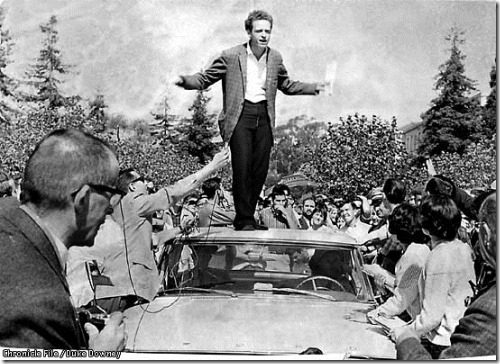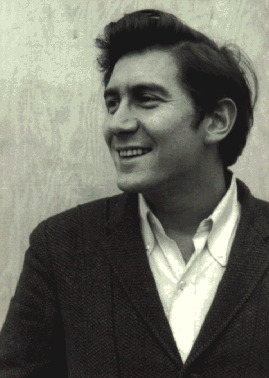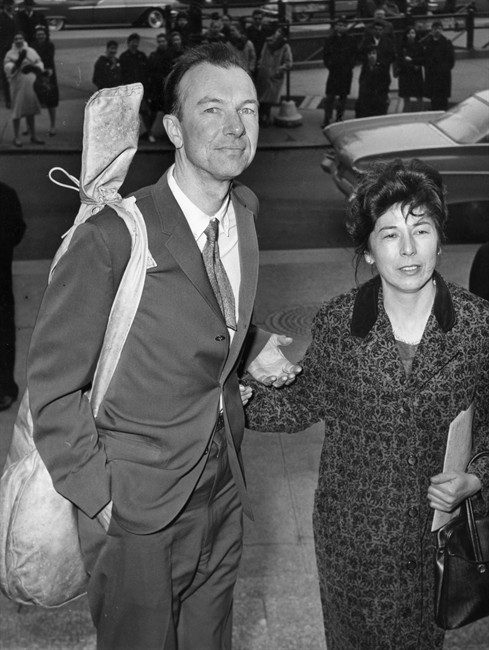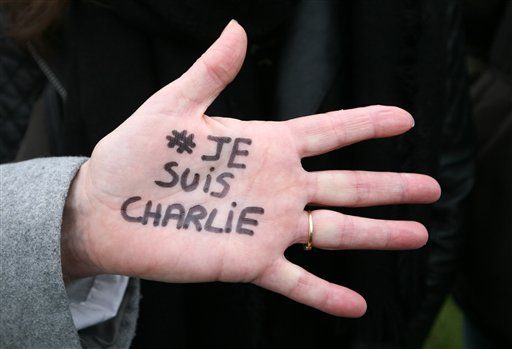THE FIRST AMENDMENT’S A BITCH, ISN’T IT?
The First Amendment’s a Bitch, Isn’t It?

Angela Davis, distinguished professor emerita, UC Santa Cruz
I received an email from my Israeli-American friend Louis Richter with the recent news that former UC Santa Cruz Professor Angela Davis was the official speaker at the University of California at Santa Cruz for Martin Luther King’s Holiday commemoration of what would have been his 86th birthday. The title of her speech was “Racism, Militarism, Poverty: From Ferguson to Palestine.” It was the keynote address of their 31st annual convocation on MLK’s birthday. The email contained an extended letter of protest from more than twenty organizations speaking as one who support Israel and were outraged that this “known anti-Zionist” who “supported boycotts against Israel” would be sponsored by the university—especially in connection with Rev. Martin Luther King, Jr.
In reply I wrote the following:
“This letter and subject raise so many issues I am afraid I don’t have time to address them all, or even summarize them adequately.
But let me say to start with: your email is the very first and only reference to this event I have received—and had it not been for you I would have been blissfully unaware of it. And this despite the fact that I am on a number of left-wing email mass-mailing lists and hear about nearly everything of interest to the broad definition of the “left.” Nonetheless, not a one of them thought it even worth mentioning that Angela Davis was going to be speaking at UCSC on this topic at this time. It further suggests to me that, just like boycott campaigns against specific films, this kind of letter only serves to call further attention to controversial speakers and make them far more visible than they would otherwise be. She could only be grateful that you (or this Jewish group) made an otherwise unremarkable public event that was on nobody’s radar screen a sudden cause celebre. It was strictly a campus event with a known brand (AD) giving an utterly predictable propaganda speech; and now it suddenly has a nationwide audience (and even international) audience. Congratulations on giving AD a Bully Pulpit, when all she had was a tiny one room microphone. You don’t even have to hear the speech; the title says it all. The worst part about it is that it is utterly boring.
Secondly, the First Amendment is a bitch, isn’t it? Wish we didn’t live in a free society where we have to put up with unpleasant personalities like AD—who has no armies at her command, has never killed anyone; doesn’t harm a soul in her daily life; has never sent a bulldozer into anyone’s neighborhood to destroy their homes; never ordered a helicopter to drop a bomb on anyone’s school, and is only a small part of what Clark Kerr called “the marketplace of ideas.”
If you don’t like what Angela Davis has to say, then by all means don’t listen to her. That’s all that needs to be said.
Thank you for keeping me informed. Hope to see you at the Folk Club.”

Mario Savio at a UC Berkeley rally
Far less abrasive personalities than Angela Davis have recently run afoul of the new norms for Political Correctness, such as standup comic and TV show host Bill Maher. He was invited to speak at Berkeley—the one-time bastion of free speech—for this year’s commencement exercises. But after his well-publicized comments on Muslim fundamentalists on his cable show Real Time a well-orchestrated campaign was mounted against his appearance—arguing that (in contrast to Angela Davis) he was prejudiced against Islam and should not be invited to speak on campus. What was so unusual and ironic about this incident, given that it occurred during the 50th anniversary of Berkeley’s Free Speech Movement last December, is that it wasn’t the Chancellor who was trying to shut him down, and it wasn’t the students who were protesting for his right to speak.
On the contrary; as Humpty-Dumpty once proclaimed: “It gets curiouser and curiouser.”
It was the students who were outraged and tried to disinvite him; and only the Chancellor who refused to be intimidated and stood up for Bill Maher’s right of freedom of expression. He would not cave in to student pressure and cancel Maher’s appearance.
Mario Savio must have been spinning in his grave—to hear Berkeley students campaign against free speech, and the Chancellor (his former nemesis when Clark Kerr occupied that position) stand up proudly to defend it. As Bob Dylan wrote, Things Have Changed.
“Free speech is free speech is free speech,” said the murdered editor of the Paris satirical weekly Charlie Hebdo—whose staff of heroic cartoonists was murdered by terrorists on January 6, in retaliation for publishing Danish cartoons of the Prophet Muhammad.
And as I said in my reply to my Israeli friend, free speech is a bitch, isn’t it? It means just what Voltaire said it meant: “I may disagree with what you have to say, but I will defend to the death your right to say it.” Easy to say; not so easy to practice, as it turns out.

Phil Ochs
That is why I keep close to my heart topical political folk singer Phil Ochs’ great anthem for free speech—I’m Gonna Say It Now:
“Oh I am just a student, Sir
And I only like to learn,
But it’s hard to read through the rising smoke
Of the books that you like to burn
So I have come to tell you, Sir,
I’m going to make a vow
When I’ve got something to say, Sir,
I’m going to say it now.”
Phil Ochs wrote this rousing defense of the First Amendment in support of the Free Speech Movement at Berkeley—upon hearing Mario Savio’s eloquent words from the Sproul Hall Steps, December 2, 1964:
“There’s a time when the operation of the machine becomes so odious, makes you so sick at heart, that you can’t take part! You can’t even passively take part! And you’ve got to put your bodies upon the gears and upon the wheels…upon the levers, upon all the apparatus, and you’ve got to make it stop! And you’ve got to indicate to the people who run it, to the people who own it, that unless you’re free, the machine will be prevented from working at all!”
Upon his death in 1996 those same steps were renamed “The Mario Savio Steps.”
That Little Old First Amendment was my small contribution to the literature of free speech, written in defense of one of the more odious “public intellectuals” of our time, former Professor Ward Churchill of the University of Colorado at Boulder, who came under media scrutiny for his phrase “Little Eichmanns” to describe the victims of the 9/11 attack on the World Trade Center. He finally lost his tenured academic position not for what he said, but for having falsified his initial resume when he applied for the job, identifying himself as a “Native American” when he wasn’t. He had also apparently plagiarized a number of his articles. None of this would ever have come to light, though, had it not been for his outrageous comments on September 11. Having invited sustained media attention, it finally destroyed his academic career.
My view, though, then as now, was that this fell within the legal concept of “fruit of a poison tree”—or evidence acquired by an illegal search and seizure. He still should have been protected by “That Little Old First Amendment:”
Chorus: I disagree
With what he had to say
But I’ll defend to the death
His right to say it anyway.
The topic of his speech
Was “On the Limits of Dissent”
We found out in a hurry
How much that really meant
They cancelled his invitation
At Hamilton College in New York
While Fox News’ Bill O’ Reilly
Was popping his champagne cork. (Ch.)
They took away his chairmanship
They tried to take his job
Will we let ourselves be silenced
By the violence of the mob
Ward Churchill is the reason
We have the first amendment
It’s the price we pay for freedom
He was Voltaire’s defendant. (Ch.)

Pete and Toshi Seeger at HUAC
Our Founding Fathers were not squeamish men; James Madison and Thomas Jefferson, who crafted the Bill of Rights, were well aware that the First Amendment would protect the rights of those they passionately disagreed with; that was its whole point and raison d’etre. They did not need a First Amendment to protect the rights of the beloved Ben Franklin; it was needed to protect the rights of the despised crackpots who but for it would be put into stocks and lashed.
In short, it was needed to protect the rights of radicals like Mario Savio. For as another such radical, 1965 SDS President the late Carl Oglesby, once said: “Democracy is nothing if not dangerous.” Carl, a personal friend, also said, “It’s not the rebels that cause the troubles of the world; it’s the troubles that cause the rebels.”
The most famous use of the First Amendment to protect the rights of one such rebel with a cause took place sixty years ago on August 18, 1955—when folk singer Pete Seeger answered a subpoena to appear before the House Committee on Un-American Activities. When asked to name names of his various political and musical friends he took the road not taken and instead of relying on the tried and true 5th Amendment protection against self-incrimination he stood on the shaky ground of the First Amendment’s guarantee of freedom of speech and assembly—in explanation of which he said so memorably, “The 5th Amendment says HUAC had no right to ask me those questions; the First Amendment says they had no right to ask any American those questions, especially under duress.”
It took six years but in 1961 the Supreme Court of the United States finally found in Pete’s favor, and cleared him of all charges stemming from his HUAC testimony. He was still blacklisted as far as the entertainment industry was concerned, but thanks to the Supreme Court he was not sent to prison for Contempt of Congress. That is one of the proudest decisions the court has ever made—for it defended the vision of the Founding Fathers against mob rule—which is what Congress during the McCarthy era had become.

Thank a folk singer for that. Thank Pete Seeger. Thank Mario Savio for reminding us of that vision—and standing up for the Enlightenment against the same forces of darkness that arrested 800 students in Sproul Hall—whose steps are named for Mario Savio.
Thank Phil Ochs, who sang out against the Vietnam War, and for the rights of students to protest. During a day-long protest in Golden Gate Park his song is all I remember.
Thank Charlie Hebdo. For wherever freedom threatens to be crushed it is ordinary people who must stand up to defend it. Thank FolkWorks, for publishing this essay.
Je suis Charlie.
Saturday, March 28, from 1:00 to 4:00 PM Ross Altman will participate in REPETE, Will Geer’s Theatricum Botanicum annual tribute to Pete Seeger at 1419 N. Topanga Canyon Blvd in Topanga Canyon. For information and tickets see www.theatricum.com
Saturday April 11, from 10:00 to 4pm Ross Altman will participate in The City of Santa Clarita’s Earth Arbor Day Festival at Central Park (27150 Bouquet Canyon Rd); Ross goes on at 3pm.
Sunday, April 12, American Folk Music Fest Ross Altman performs. www.jenniferdiamondfoundation.org/events/american-folk-music-fest-performers
Los Angeles folk singer Ross Altman has a PhD in Modern Literature; Ross may be reached at greygoosemusic@aol.com













